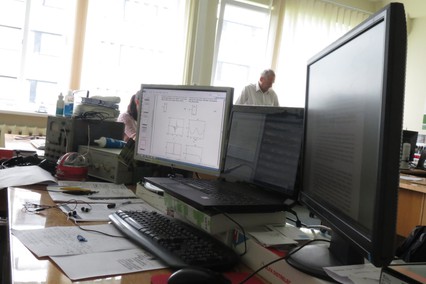Description
Electronics is the technology associated with electronic circuits and systems, and is one of the major branches of electrical engineering. Electronics engineers use scientific knowledge of the behaviour and effects of electrons to design, develop and test components, devices, systems or equipment that use electricity as part of their source of power. These components include capacitors, diodes, resistors and transistors. Electronics engineers usually work in cross-functional project teams with colleagues in other branches of engineering.
Tasks:
1. Design wide array of electronics, from speakers to TVs to audio equipment
2. Develop, test, and supervise the manufacture of electronic equipment such as broadcast and communications systems
3. Utilize ferroelectric, nonlinear, dielectric, phosphorescent, photo-conductive, and thermoelectric properties of materials
4. Create test control apparatus and equipment
5. Work in areas such as communications, signal processing, and control systems
6. Develop new applications of conductive properties of metallic and non-metallic materials to be used in components
7. Test, troubleshoot, and isolate malfunctioning equipment
8. Read schematics and maintenance manuals; direct field operations and maintenance of electronic installations
9. Develop electronic principles and technology in fields
10. Research parts availability and costs
Key skills for Electronics Engineer:
United Kingdom: £37,000 per year
United States of America: $95,380 per year
Australia: AU$65,960 per year
Qualifications and training required:
Most electronics engineers have a degree in electrical or electronic engineering, or engineering technology. Other relevant subjects for entry into the profession include: communications engineering; aeronautical engineering; mechanical engineering; physics and applied physics; computer/computer-aided engineering; production and manufacturing engineering; mathematics; computer science/software engineering.
When looking for your first job, it may help you if you have work experience. You can gain this through a work placement as part of a sandwich degree course, or by arranging your own placement with relevant companies. You may also be able to get into this career by taking apprenticeship in an area such as advanced manufacturing, which covers electronics.
Most large firms offer structured training and encourage professional status. Companies usually offer in-service training and short courses for specific needs.
Tasks:
1. Design wide array of electronics, from speakers to TVs to audio equipment
2. Develop, test, and supervise the manufacture of electronic equipment such as broadcast and communications systems
3. Utilize ferroelectric, nonlinear, dielectric, phosphorescent, photo-conductive, and thermoelectric properties of materials
4. Create test control apparatus and equipment
5. Work in areas such as communications, signal processing, and control systems
6. Develop new applications of conductive properties of metallic and non-metallic materials to be used in components
7. Test, troubleshoot, and isolate malfunctioning equipment
8. Read schematics and maintenance manuals; direct field operations and maintenance of electronic installations
9. Develop electronic principles and technology in fields
10. Research parts availability and costs
Key skills for Electronics Engineer:
- Excellent maths, science, technology and IT skills
- The ability to analyse complex problems and assess possible solutions
- The ability to explain design ideas clearly
- The ability to prioritise and plan effectively
- Good budgetary skills
- Excellent team working and people skills
United Kingdom: £37,000 per year
United States of America: $95,380 per year
Australia: AU$65,960 per year
Qualifications and training required:
Most electronics engineers have a degree in electrical or electronic engineering, or engineering technology. Other relevant subjects for entry into the profession include: communications engineering; aeronautical engineering; mechanical engineering; physics and applied physics; computer/computer-aided engineering; production and manufacturing engineering; mathematics; computer science/software engineering.
When looking for your first job, it may help you if you have work experience. You can gain this through a work placement as part of a sandwich degree course, or by arranging your own placement with relevant companies. You may also be able to get into this career by taking apprenticeship in an area such as advanced manufacturing, which covers electronics.
Most large firms offer structured training and encourage professional status. Companies usually offer in-service training and short courses for specific needs.
Companies in profession
Best students in profession
Professions you might be interested in
Virtual internship
Company recommended study programs
Latvijas Finieris
2 recommendations
Elektronika
Rīgas Tehniskā universitāte
- 5 company recommendations
Elektrotehnoloģiju datorvadība
Rīgas Tehniskā universitāte
- 7 company recommendations
MIKROTĪKLS
2 recommendations
Lietiškā enerģētika - profesionālās augstākās izglītības bakalaura studiju programma
LBTU - Latvijas Biozinātņu un tehnoloģiju universitāte
- 4 company recommendations
Enerģētika un elektrotehnika
Rīgas Tehniskā universitāte
- 1 company recommendations
AE Partner SIA
1 recommendations
Elektronika un mobilie sakari
Rīgas Tehniskā universitāte
- 16 company recommendations
MTTC Latvija, SIA
2 recommendations
ELEKTRISKĀS IEKĀRTAS
Rīgas Tehniskā koledža
- 16 company recommendations
Elektronika un mobilie sakari
Rīgas Tehniskā universitāte
- 16 company recommendations
HansaMatrix Pārogre
2 recommendations
Elektrotehniķis, Elektrisko tīklu tehniķis, Elektromontāžas tehniķis, (Rūpnīcu elektroiekārtu tehniķis)
Ventspils Tehnikums
- 4 company recommendations
Elektronika
Rīgas Tehniskā universitāte
- 5 company recommendations
Biedrība LEtERA
2 recommendations
Bakalaura studiju programma „Elektronikas inženierija”
Ventspils Augstskola
- 5 company recommendations
Elektronika
Rīgas Tehniskā universitāte
- 5 company recommendations
Hairostraight
2 recommendations
Bakalaura studiju programma „Elektronikas inženierija”
Ventspils Augstskola
- 5 company recommendations
Elektronika un mobilie sakari
Rīgas Tehniskā universitāte
- 16 company recommendations
Todo
1 recommendations
Enerģētika un elektrotehnika
Rīgas Tehniskā universitāte
- 39 company recommendations
EVOPIPES
1 recommendations
Elektrotehnoloģiju datorvadība
Rīgas Tehniskā universitāte
- 1 company recommendations
Elektronikas un datorzinātņu institūts
2 recommendations
Elektronika un mobilie sakari
Rīgas Tehniskā universitāte
- 16 company recommendations
Bakalaura studiju programma „Elektronikas inženierija”
Ventspils Augstskola
- 5 company recommendations
Hansab
1 recommendations
Elektronika un mobilie sakari
Rīgas Tehniskā universitāte
- 16 company recommendations
GreyNut
1 recommendations
Elektronika un mobilie sakari
Rīgas Tehniskā universitāte
- 16 company recommendations
In our portal we are using cookies. Using the portal, you agree to the use of cookies. You can find out more!
Accept


